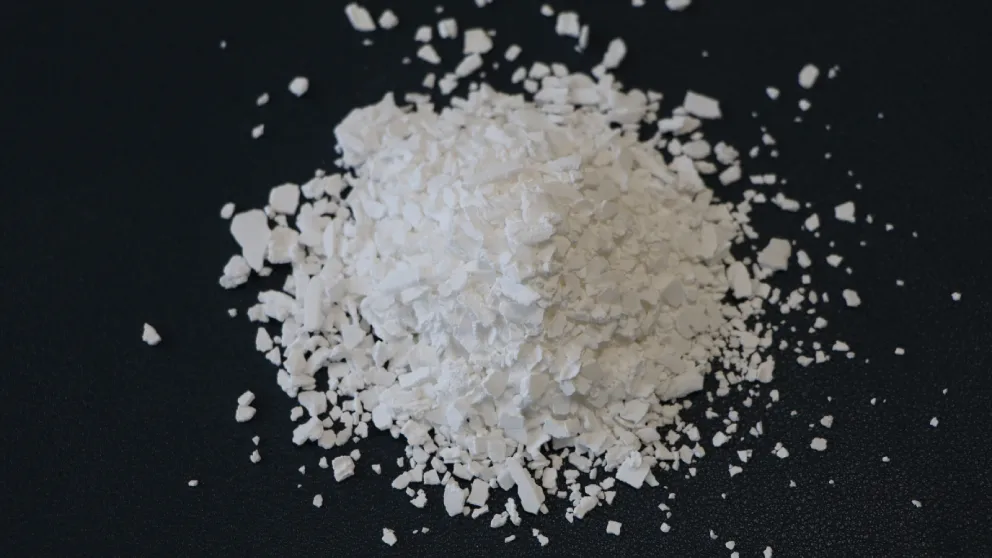Navigating the world of ice melt solutions can be complex. Choosing the right product is critical for safety, cost-efficiency, and protecting your property. In the debate between Calcium Chloride and Calcium Magnesium Acetate (CMA), which de-icer comes out on top? As industry experts, XRD Chemical is here to provide a clear, comprehensive comparison to guide your decision this winter.
We'll examine the key characteristics of both calcium chloride and calcium magnesium acetate, empowering you to make an informed choice to tackle ice and snow effectively.
Calcium Chloride Ice Melt: Power and Performance

Calcium Chloride is a powerhouse ice melt solution renowned for its rapid action and exceptional performance in extreme cold. It works by exothermically absorbing moisture from its surroundings, aggressively lowering the freezing point of water to prevent ice formation and quickly break down existing pack.
Pros of Calcium Chloride:
- Unmatched Cold Weather Performance: Effective down to -25°F, making it the most reliable choice for severe winter conditions.
- Rapid Action: Begins working immediately, melting ice significantly faster than rock salt or sand.
- Deep Penetration: Its hygroscopic nature allows it to bore through thick ice layers for thorough de-icing.
- Long-Lasting Residual Effect: Provides extended protection against refreezing, reducing the need for frequent re-application.
- Proven Cost-Effectiveness: Its potency and longevity often result in a lower cost per square foot treated.
Cons of Calcium Chloride:
- Environmental Considerations: While better than many alternatives, it can still pose risks to vegetation and waterways if over-applied.
- Corrosivity: Can be corrosive to untreated metals if used improperly.
XRD Chemical's Recommended Calcium Chloride Solutions

For superior and precise de-icing performance, XRD Chemical offers a comprehensive range of high-purity calcium chloride formulations to meet every specific need and application method:
- Calcium Chloride Anhydrous Pellets (94-97% CaCl₂): Our anhydrous pellets represent the pinnacle of ice-melting performance. With the highest concentration of calcium chloride and extremely low water content, they generate intense exothermic heat upon contact with moisture, resulting in the fastest possible melting action, even in temperatures far below -25°F. Ideal for critical infrastructure, airfields, and emergency response situations where speed and extreme cold weather performance are non-negotiable.
- Calcium Chloride Anhydrous Powder (94-97% CaCl₂): This fine-powder form offers the ultimate in rapid dissolution and spreadability. The anhydrous powder is perfect for pre-treatment (anti-icing) before a storm, as it creates a quick-acting barrier that prevents ice from bonding to surfaces. Its high purity makes it exceptionally effective for a powerful, immediate melt.
- Calcium Chloride Dihydrate Pellets (74-77% CaCl₂): A robust and cost-effective choice for general commercial and municipal use. These pellets offer an excellent balance of performance, longevity, and value. They are less prone to dusting than powder, provide sustained melting power, and are well-suited for spreader application on roads, parking lots, and sidewalks.
- Calcium Chloride Dihydrate Powder (74-77% CaCl₂): This versatile powder is a workhorse for various de-icing and dust control applications. It provides reliable performance at a lower cost than anhydrous options. It's commonly used for parking garages, driveways, and as a supplement in pre-wet systems for rock salt to enhance effectiveness.
- Calcium Chloride Dihydrate Flakes (77-80% CaCl₂): Our dihydrate flakes are renowned for their high surface area and rapid dissolving properties. This form is exceptionally easy to handle and spread evenly, either manually or mechanically. It's an excellent all-purpose choice for landscapers, property managers, and homeowners seeking a highly effective and fast-acting product that is easier to apply than fine powders.
Calcium Magnesium Acetate (CMA): The Eco-Conscious Choice

Calcium Magnesium Acetate (CMA) is a chloride-free, biodegradable de-icing agent. It primarily works by preventing ice bonds from forming on pavement surfaces, making mechanical removal easier.
Pros of Calcium Magnesium Acetate (CMA):
- Environmentally Friendly: CMA is biodegradable and poses minimal risk to soil, pets, wildlife, and surrounding vegetation.
- Low Corrosivity: It is non-corrosive to concrete, metals, and other surfaces, helping to protect infrastructure.
- Pet and Plant Safe: A preferred choice for areas where environmental impact is a top priority.
Cons of Calcium Magnesium Acetate (CMA):
- Limited Temperature Range: Effectiveness decreases significantly below 20°F, making it unsuitable for deep freezes.
- Higher Cost: CMA is typically more expensive per unit than chloride-based alternatives.
- Slower Action: It is not designed for rapid melting and is better suited for anti-icing (prevention) rather than melting heavy accumulation.
The Showdown: Calcium Chloride vs. Calcium Magnesium Acetate
Here’s a direct head-to-head comparison to simplify your choice:
| Aspect | Calcium Chloride | Calcium Magnesium Acetate (CMA) |
|---|---|---|
| Ice Melting Performance | Superior. Faster, more aggressive, and effective in much colder temperatures. | Moderate. Best for mild conditions and anti-icing. Performance plummets below 20°F. |
| Cost-Effectiveness | High. Lower initial cost and greater melting power reduce long-term expense. | Low. Higher purchase price and less effective per pound. |
| Longevity & Residual Effect | Excellent. Continues working for an extended period to prevent refreezing. | Fair. Washes away more easily and needs more frequent application. |
| Environmental Impact | Moderate. Requires careful, directed application to minimize impact. | Excellent. The clear winner for minimal environmental footprint. |
| Surface Safety | Good when used as directed. | Excellent. Non-corrosive and safe for most surfaces. |
Which One Is Better? Calcium Chloride vs. Calcium Magnesium Acetate
The "better" product depends entirely on your primary need.
- Choose Calcium Chloride for: Unbeatable melting power, extreme cold weather performance, fast action, and overall cost-effectiveness. It is the definitive choice for most commercial, municipal, and residential applications where reliability is paramount.
- Choose Calcium Magnesium Acetate (CMA) for: Situations where environmental impact is the absolute highest priority, regardless of cost or lower performance, such as near sensitive water sources or protected natural areas.
For most users seeking a powerful, reliable, and cost-effective solution, high-quality Calcium Chloride ice melt from XRD Chemical provides the optimal balance of performance and value. Explore our full range of de-icing products to find the perfect match for your winter challenges.




